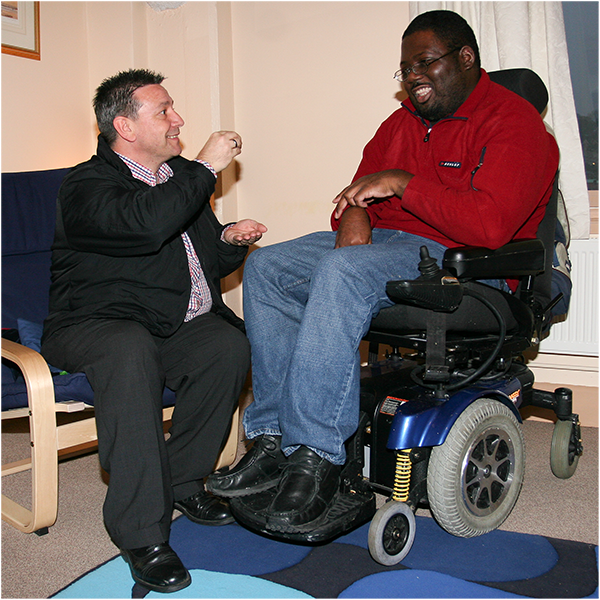Today,
the Government
 The Government are the people who run the country. The Government decide how much tax people should pay and how things like the National Health Service (NHS) should work.
published new
guidance
The Government are the people who run the country. The Government decide how much tax people should pay and how things like the National Health Service (NHS) should work.
published new
guidance
 Guidance means being given clear instructions to be able to do something well.
on family visits in care homes for the second lockdown.
Guidance means being given clear instructions to be able to do something well.
on family visits in care homes for the second lockdown.
The Government has introduced new measures for care home providers to facilitate family contact using arrangements such as substantial screens, visiting pods, and window visits.
However, the new guidance is only for care homes and as yet guidance for
supported living
 Supported living is when you live in your own home with support from staff. People who live in supported living have a tenancy agreement.
services is yet to be updated.
Supported living is when you live in your own home with support from staff. People who live in supported living have a tenancy agreement.
services is yet to be updated.
Edel Harris, Chief Executive of the learning disability
A learning disability is to do with the way someone's brain works. It makes it harder for someone to learn, understand or do things. charity Mencap, said:
“We’re glad the Government changes its position on the blanket ban on family visits in care homes, but these prison-style measures are not the solution. They are expensive and impractical, and many people who have a learning disability will find them confusing and potentially distressing. It also isn’t clear whether this guidance also applies to supported living services – leaving thousands of people with a learning disability and their families still in limbo.
“Many families have been separated for eight months now; in some cases, people with a learning disability think they’ve been abandoned by their loved ones. This cannot go on. The Government must take an individualised approach to family visits that balances the risks of catching coronavirus with mental wellbeing. To do this, the Government must provide regular testing and emergency funding to support all social care
Social care means the services that give care and support to people who need it. providers, including supported living services, to enable safe family contact.”
Read the Government guidance in full online here: https://www.gov.uk/government/publications/visiting-care-homes-during-coronavirus/update-on-policies-for-visiting-arrangements-in-care-homes
- Ends –
For further information or to arrange interviews, contact Mencap’s media team on:
- media@mencap.org.uk
- 020 7696 5414 (including out of hours).
Notes to editors
1. Mencap is calling for:
- a clear plan for supporting the whole care market, including services for work-aged disabled adults which currently make up over half of the total social care
budget
 A budget is a plan where you look at how much money you have and how you will spend it.
A budget is a plan where you look at how much money you have and how you will spend it.
- additional funding to meet current demand for support and stabilise the sector
- a road map towards the Government's plans for social care reform, including a long-term funding solution, fairer access to services and support and workforce reform
- Social care reform and long-term funding must cover a range of services and support that people with a learning disability need beyond personal care to enable them to lead independent and fulfilling lives in their
community
 A community is the people and places in an area.
.
A community is the people and places in an area.
.
2. The social care sector needed an £8 billion investment in social care in England is needed to restore adequate levels of quality and access to what it was a decade ago, according to the Lords Economic Affairs Committee report. While the Association of Directors of Adults Social Services’ latest Budget Survey revealed that there is a growing hole in local authorities budgets for services supporting people with a learning disability – up to £200m in 2020/21 from £180m in 2019/20.
The coronavirus pandemic has led to local councils in England facing at least a £6.6bn increase in social care costs up to the end of September, according to the Local Government Association and the Association of Directors of Adults Social Services.
About Mencap
There are 1.5 million people with a learning disability in the UK. Mencap works to support people with a learning disability, their families and carers by fighting to change laws, improve services and access to
education
 Education is when you learn things. When you fill in a form to get a job, education means you write where you went to school, college or university.
,
employment
Education is when you learn things. When you fill in a form to get a job, education means you write where you went to school, college or university.
,
employment
 Employment means having a job.
and
leisure
Employment means having a job.
and
leisure
 Leisure is when you have time to do things you enjoy like playing sports or going to the pub.
facilities. Mencap supports thousands of people with a learning disability to live their lives the way they want. www.mencap.org.uk.
Leisure is when you have time to do things you enjoy like playing sports or going to the pub.
facilities. Mencap supports thousands of people with a learning disability to live their lives the way they want. www.mencap.org.uk.
For advice and information about learning disability and Mencap services in your area, contact Mencap’s Freephone Learning Disability Helpline on 0808 808 1111 (9am-6pm, Monday-Friday) or email helpline@mencap.org.uk.
What is a learning disability?
- A learning disability is a reduced intellectual ability which can cause problems with everyday tasks – for example shopping and cooking, or travelling to new places – which affects someone for their whole life;
- Learning disability is NOT a mental illness or a learning difficulty, such as
dyslexia
 Dyslexia is a learning difficulty. People who have dyslexia can find it hard to read, write and spell.
. Very often the term ‘learning difficulty’ is wrongly used interchangeably with ‘learning disability’;
Dyslexia is a learning difficulty. People who have dyslexia can find it hard to read, write and spell.
. Very often the term ‘learning difficulty’ is wrongly used interchangeably with ‘learning disability’; - People with a learning disability can take longer to learn new things and may need support to develop new skills, understand difficult information and engage with other people. The level of support someone needs is different with every individual. For example, someone with a severe learning disability might need much more support with daily tasks than someone with a mild learning disability.